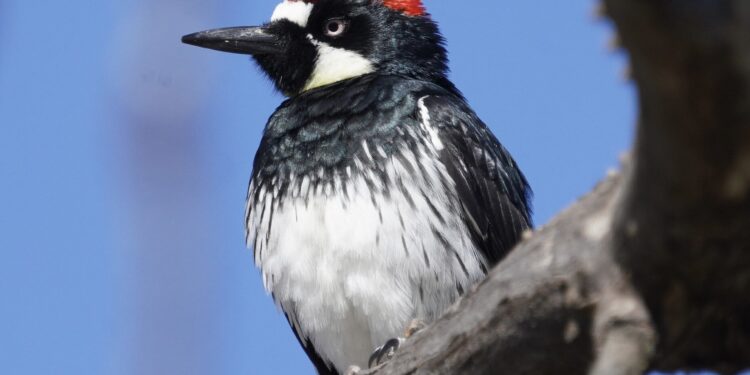Credit: Pixabay/CC0 Public domain
Human-caused climate change has helped turn many forests into kindling: a 2016 study found that greenhouse-induced warming and drought had more than doubled the area of fire-susceptible forests in the western United States since the mid-1980s. And of the wildfires recorded in California since the 1930s, the seven largest by area have all occurred since 2018.
Much of the damage caused by wildfires involves people, often in terms of the displacement of human residents or the destruction of their colonies. But wildlife also pays the price. The wildfires that ravaged Australia between mid-2020 and early 2021, for example, killed or displaced around 3 billion animals.
In an effort to document the less obvious effects of wildfires, Allison Johnson, Daizaburo Shizuka and their colleagues in Nebraska looked at the acorn woodpecker, a species that inhabits western North America.
Unlike most species, acorn woodpeckers practice cooperative breeding, in which juveniles or adults without a partner will stay to help care for the young until they find their own breeding opportunities. This search often includes daily forays into neighboring territories.
Wondering whether wildfire smoke might influence these incursions, the team tracked 37 radio-tagged acorn woodpeckers living in the Hastings Natural History Preserve in California. During the summer of 2020, two nearby wildfires produced plumes of smoke that satellite imagery classified into one of three categories: fine, medium and thick. The team analyzed the location and movements of these 37 specimens before, during and after the fires.
On days with medium or heavy smoke, acorn woodpeckers spent more time in their home territories and less time visiting others, especially those relatively distant from their own. Woodpeckers were also less likely to be found in close proximity, suggesting that the smoke cost them the ability to interact and coordinate their movements, even during the forays they made.
The results, published in Current biologyindicate that where there is smoke, even instead of fire, wildlife may be forced to adapt their behavior in detrimental ways, the team said.
Although the study established a clear link between the presence of smoke and changes in behavior, further research could clarify the extent to which these changes depend on the severity of the smoke – an increasingly relevant concern in a context intensification of forest fires.
More information:
Allison E. Johnson et al, Acorn woodpecker movements and social networks change with wildfire smoke, Current biology (2023). DOI: 10.1016/j.cub.2023.08.096
Provided by University of Nebraska-Lincoln
Quote: Wildlife smoke can slow down the movements and sociability of woodpeckers (January 24, 2024) retrieved January 25, 2024 from
This document is subject to copyright. Apart from fair use for private study or research purposes, no part may be reproduced without written permission. The content is provided for information only.



